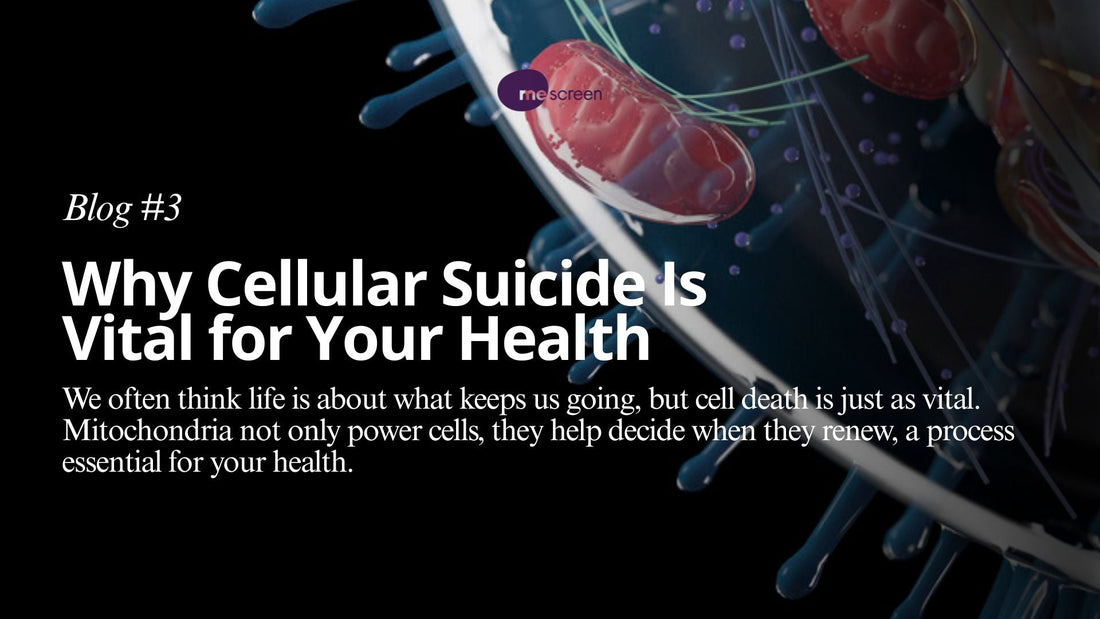Understanding Mitochondrial Health: A Weekly Learning Series
☠️ They Help Decide When a Cell Should Die: Why Cellular Suicide Is Vital for Your Health
When we think about what keeps us alive, we often focus on things like our heartbeat, lungs, or even what we eat. But life is just as much about what ends as it is about what continues.
Believe it or not, your cells are constantly dying, and that’s a good thing.
Behind the scenes, mitochondria, those famous “powerhouses of the cell”, aren’t just responsible for making energy. They also play a key role in one of biology’s most important and misunderstood processes: programmed cell death, or apoptosis.
Yes, your mitochondria help decide when a cell should die. It sounds dark, but it’s absolutely essential for your health.
🧬 What Is Apoptosis?
Apoptosis is the scientific term for programmed cell death, a built-in system your body uses to remove old, damaged, or potentially dangerous cells in a controlled and clean way.
Unlike uncontrolled cell death (like in injury or disease), apoptosis is precise and purposeful. It’s like a self-destruct sequence designed to protect the whole organism.
Examples of when apoptosis is necessary:
- Eliminating damaged cells that could turn cancerous
- Removing infected cells during immune responses
- Shaping organs during development (like fingers forming in the womb)
- Balancing the immune system by removing excess white blood cells after infection
Without apoptosis, your body wouldn’t be able to renew itself, defend itself, or maintain balance.
🏭 Mitochondria: More Than Just Powerhouses
While mitochondria are best known for producing ATP (the energy your cells need), they also serve as gatekeepers for cell death. Here’s how it works:
- When a cell is stressed or damaged, internal signals are sent to the mitochondria.
- In response, mitochondria release molecules like cytochrome c from their inner membrane.
- These molecules activate a cascade of proteins called caspases, enzymes that begin to dismantle the cell.
- The cell essentially shuts itself down from the inside, breaking into clean, recyclable parts.
This process is highly regulated. Mitochondria only initiate it when it’s truly needed, like a carefully calculated decision, not an accident.
🛡 Why Cell Death Is Crucial for Health
Here’s what can happen when apoptosis, and mitochondrial control over it, goes wrong:
Too little apoptosis
- Cells that should die don’t
- Linked to cancer, autoimmune disease, and chronic inflammation
Too much apoptosis
- Healthy cells are destroyed prematurely
- Linked to neurodegenerative diseases like Parkinson’s and Alzheimer’s, as well as tissue damage in stroke or heart disease
Mitochondria help maintain that delicate balance, deciding who stays and who goes, so that your body functions smoothly.
🔬 How This Connects to Your Energy & Health
It may seem strange, but how your mitochondria handle cell death is deeply connected to how they manage your energy, immunity, and aging.
When mitochondria are under stress, from things like poor nutrition, toxins, chronic stress, or lack of sleep, their ability to manage both ATP production and apoptosis gets disrupted.
This can lead to:
- More inflammation
- Weaker immune defense
- Build-up of senescent (zombie) cells
- Faster aging and degeneration
Maintaining mitochondrial health isn’t just about boosting energy, it’s about ensuring your body knows when to hold on and when to let go.
📊 Want to Know How Your Mitochondria Are Doing?
If you’re feeling run-down, inflamed, or out of sync, there could be issues deep within your cellular energy system. Tools like mescreen™ can help you assess:
- Your mitochondrial efficiency
- Your body’s ability to handle oxidative stress
- Early signs of cellular dysfunction
Understanding these signals can empower you to take action, through nutrition, movement, recovery, and targeted support.
🧠 Final Thought: Death with Purpose = Life with Vitality
It may sound morbid, but your body’s ability to let go of what no longer serves it, at the cellular level, is part of what keeps you alive, vibrant, and resilient. Thanks to your mitochondria, this process happens seamlessly every single day. Because in biology, as in life, knowing when to end is just as important as knowing when to begin.
References
- Green, D. R., & Reed, J. C. (1998). Mitochondria and apoptosis. Science, 281(5381), 1309–1312. DOI
- Elmore, S. (2007). Apoptosis: a review of programmed cell death. Toxicologic Pathology, 35(4), 495–516. DOI
- Wang, C., & Youle, R. J. (2009). The role of mitochondria in apoptosis. Annual Review of Genetics, 43, 95–118. DOI
- Kroemer, G., Galluzzi, L., & Brenner, C. (2007). Mitochondrial membrane permeabilization in cell death. Physiological Reviews, 87(1), 99–163. DOI
- National Cancer Institute. Apoptosis.
- Youle, R. J., & Strasser, A. (2008). The BCL-2 protein family: opposing activities that mediate cell death. Nature Reviews Molecular Cell Biology, 9(1), 47–59. DOI
- NIH: MedlinePlus Genetics. Mitochondria.

